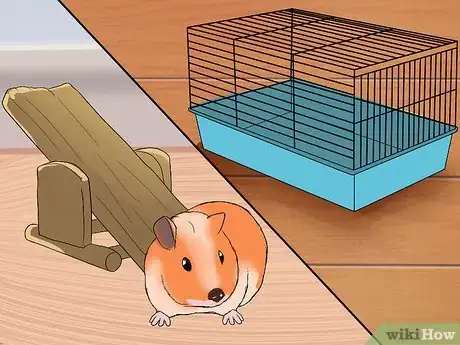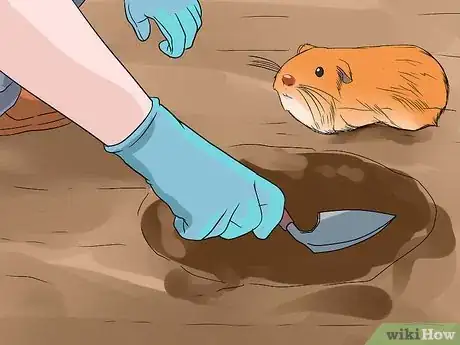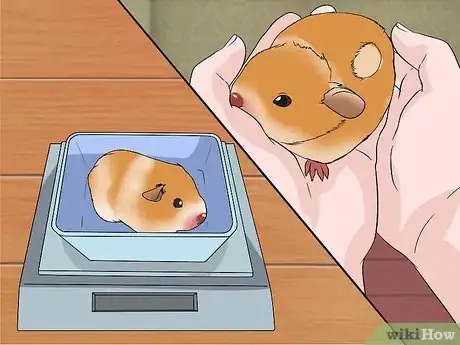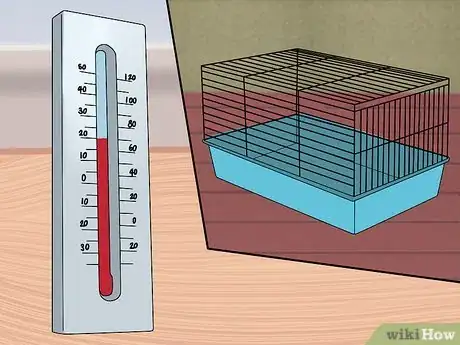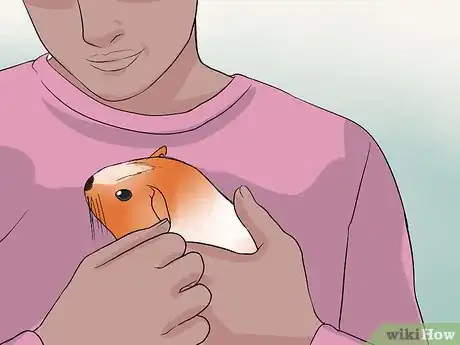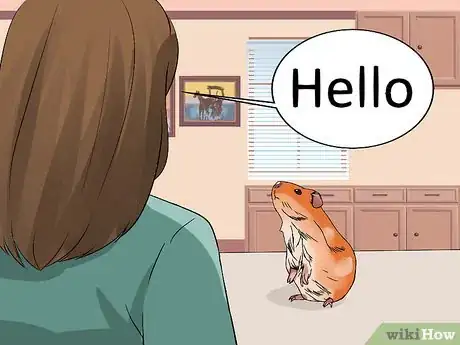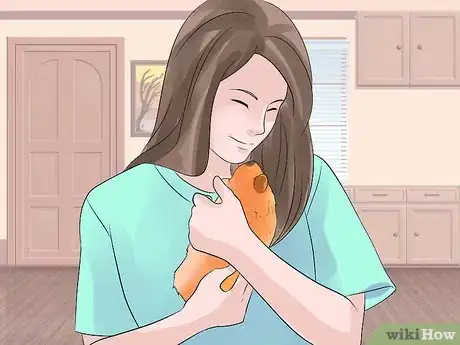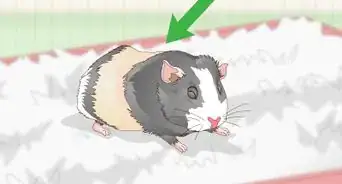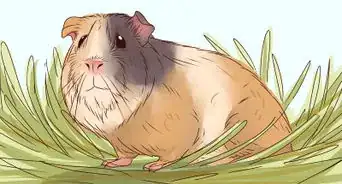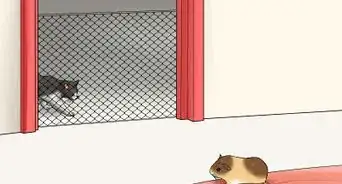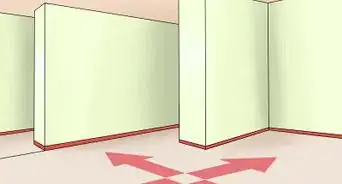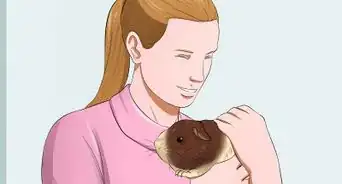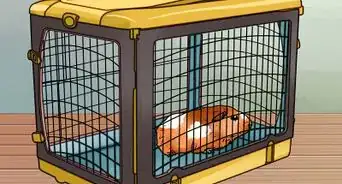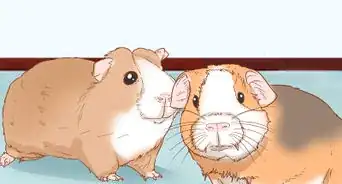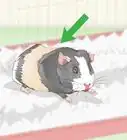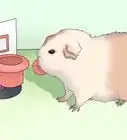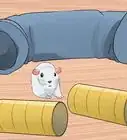This article was co-authored by Pippa Elliott, MRCVS. Dr. Elliott, BVMS, MRCVS is a veterinarian with over 30 years of experience in veterinary surgery and companion animal practice. She graduated from the University of Glasgow in 1987 with a degree in veterinary medicine and surgery. She has worked at the same animal clinic in her hometown for over 20 years.
There are 7 references cited in this article, which can be found at the bottom of the page.
wikiHow marks an article as reader-approved once it receives enough positive feedback. This article received 12 testimonials and 100% of readers who voted found it helpful, earning it our reader-approved status.
This article has been viewed 310,092 times.
Guinea pigs are social animals that naturally live in groups. While it's best to have more than one guinea pig in your home at a time, this is not always possible. Make sure you know how to keep you guinea healthy, happy, and secure in his environment even without a cage mate.
Steps
Providing a Good Living Space
-
1Provide plenty of entertainment. A guinea pig without a cage mate will need a lot of stimulation due to the large amount of time spent alone. Make sure to provide your guinea pig with plenty of toys so he won't grow bored in his cage.
- Ping pong balls provide a lot of entertainment as guinea pigs enjoy chewing and chasing. You can also find balls specifically made for guinea pigs at Petco or a local pet store. Be careful, however. If you notice your guinea pig chewing excessively, you might want to take the ball away.[1]
- Wooden structures, sometimes called hidey houses, are great if your guinea pig likes to hide or run. They can be made at home from cardboard boxes or purchased from local pet stores.[2]
- As guinea pigs love to chew, shredded paper, cardboard, old socks, pine cones, and twigs can be great. However, do not give a guinea pig materials like wool or cotton that tear thin. There's a risk that, when ingested, such materials will tangle inside a guinea pig's intestines.[3]
-
2Consider gardening. If you have a garden, or a backyard, planting and maintaining foliage can be a great activity for you and your guinea pig.
- Guinea pigs enjoy being outside. If your garden is fenced in, you could take him out in the garden with you while you work. Keep a close eye on him, however, so he doesn't find a way through the gate.[4]
- Never put your guinea pig on a harness and leash as it would be very easy to hurt the guinea pig with them or they could slip out. Instead consider an enclosed run big enough for you and your guinea pig.
- Guinea pigs enjoy the opportunity to be outside. Gardening is a great way to spend time with your guinea pig while engaging in necessary tasks. Just be sure that your guinea pig can't ingest any poisonous plants. [5]
Advertisement -
3Allow your guinea pig limited access to your house. Your guinea pig might feel bored or stressed if confined to his cage all day without a cage mate. You can have one guinea pig friendly room in your house for him to run and play.
- Guinea pig proof the room, making sure there are no open outlets or materials the guinea pig might chew on. Keep it closed off, as guinea pigs are notorious hiders and can be difficult to find in a big house.[6]
- Pick a room you spend time in, so your guinea pig can interact with you while exploring the new space.[7]
- Always have a guinea pig safe structure, like a cardboard box, present. If your guinea pig feels overwhelmed or threatened, he'll need a place to hide.[8]
Monitoring Your Guinea Pig's Health
-
1Watch for weight loss or gain. If guinea pigs are alone in a cage, you need to be extra vigilant about their well-being. Health problems can result due to the stress of loneliness. Keep an eye on your guinea pig's weight, as this is generally one of the first warnings of poor health.
- Guinea pigs often help keep one another active via playing and wrestling. A lone guinea pig may become sedentary and put on weight. Make sure your guinea pig gets adequate exercise and does not put on too much weight.[9]
- Conversely, guinea pigs can lose interest in food if feeling stressed and isolated. Make sure your guinea pig is eating enough food and that he does not lose weight rapidly.[10]
-
2Make sure the temperature is safe. Guinea pigs often rely on cage mates for warmth as they huddle together in the cold. As guinea pigs are prone to upper respiratory problems, pay particularly close attention to maintaining a warm environment.
- Keep the cage off the floor and away from areas prone to drafts. The temperature should be stable and around 65 to 75 degrees Fahrenheit.[11]
- Make sure your provide warm bedding for your guinea pig so he can crawl into a warm space if he gets cold. Guinea pig beds are available online or at many pet stores.
-
3Look for signs of stress and depression. Emotionally, guinea pigs may suffer as a result of living alone. Know the signs of stress and depression in guinea pigs. If you notice them occurring frequently, especially when coupled with physical ailments, you may want to consider getting another guinea pig. Sometimes, despite best efforts, guinea pigs do not adjust to solo living.
- Fidgeting, especially in the form of rapid head movement, is a sign of stress. This means your guinea pig is scared or feels uncomfortable. He might also bare his teeth when approached, a sign of aggression.[12]
- Depressed guinea pigs tend to become listless. He will probably not display much energy or show interest in food or play.[13]
Playing with Your Guinea Pig
-
1Understand your guinea pig needs time. Guinea pigs are pack animals, meaning they're social by nature. If your guinea pig doesn't have a cage mate, it's extra important you establish a bond with him. However, guinea pigs can be skittish and it takes time for them to feel comfortable around people.
- Take things slow. Talk to the guinea pig from outside his cage and let him come to you willingly. Never pull a guinea pig out of the cage against his will. This can make him feel threatened and increase his sense of isolation.[14]
- Allow your guinea pig to sniff your hand. Simply place your hand inside his cage and allow him to come and inspect you. You should allow him to familiarize himself with your scent before attempting to handle him or pick him up.[15]
-
2Use verbal cues to make your guinea pig feel safe. Your guinea pig should associate your voice, which he'll hear a lot from his cage, with comfort and security.
- Keep your guinea pig's cage in the area of your home where you're the most present. This way, he'll get used to seeing and hearing you. When you interact with him, use his name frequently so he learns to respond to it.
- Use positive feedback when you talk to your guinea pig. While speaking to him, offer him something to eat. Carrots, lettuce, grapes, and berries are good, healthy options for guinea pig treats.
- Sometimes, it's helpful to engage in one-sided conversations with your guinea pig. Tell him about your day, your plans, your social life, and anything else that's on your mind. Hearing your voice frequently will soothe your guinea pig. Guinea pigs are social animals and crave interaction of any kind.
-
3Dedicate a lot of time to your guinea pig. If your guinea pig does not have a cage mate, he will need extra attention from his human companion. Part of the reason people find it so difficult to have only one guinea pig is that they simply don't have the time.
- You should aim to spend 2 hours a day interacting with your guinea pig if he doesn't have a cage mate.[16]
- You can plan time each day to dedicate to your guinea pig. Divide into hour or half hour play periods that work with your scheduling, totaling two hours a day.
- If you live with family, roommates, or a significant other, you can try asking them to spend time with the guinea pig if they're able.
Expert Q&A
Did you know you can get expert answers for this article?
Unlock expert answers by supporting wikiHow
-
QuestionHow can I help my lonely guinea pig?
 Pippa Elliott, MRCVSDr. Elliott, BVMS, MRCVS is a veterinarian with over 30 years of experience in veterinary surgery and companion animal practice. She graduated from the University of Glasgow in 1987 with a degree in veterinary medicine and surgery. She has worked at the same animal clinic in her hometown for over 20 years.
Pippa Elliott, MRCVSDr. Elliott, BVMS, MRCVS is a veterinarian with over 30 years of experience in veterinary surgery and companion animal practice. She graduated from the University of Glasgow in 1987 with a degree in veterinary medicine and surgery. She has worked at the same animal clinic in her hometown for over 20 years.
Veterinarian
-
QuestionHow can I tell if my guinea pig likes me?
 Pippa Elliott, MRCVSDr. Elliott, BVMS, MRCVS is a veterinarian with over 30 years of experience in veterinary surgery and companion animal practice. She graduated from the University of Glasgow in 1987 with a degree in veterinary medicine and surgery. She has worked at the same animal clinic in her hometown for over 20 years.
Pippa Elliott, MRCVSDr. Elliott, BVMS, MRCVS is a veterinarian with over 30 years of experience in veterinary surgery and companion animal practice. She graduated from the University of Glasgow in 1987 with a degree in veterinary medicine and surgery. She has worked at the same animal clinic in her hometown for over 20 years.
Veterinarian
-
QuestionIf they have to depart from a loving family, will they become depressed?
 Pippa Elliott, MRCVSDr. Elliott, BVMS, MRCVS is a veterinarian with over 30 years of experience in veterinary surgery and companion animal practice. She graduated from the University of Glasgow in 1987 with a degree in veterinary medicine and surgery. She has worked at the same animal clinic in her hometown for over 20 years.
Pippa Elliott, MRCVSDr. Elliott, BVMS, MRCVS is a veterinarian with over 30 years of experience in veterinary surgery and companion animal practice. She graduated from the University of Glasgow in 1987 with a degree in veterinary medicine and surgery. She has worked at the same animal clinic in her hometown for over 20 years.
Veterinarian
References
- ↑ http://www.happycavy.com/cheap-free-guinea-pigs-toys-cavy-will-love/
- ↑ http://www.guineapigcages.com/toys.htm
- ↑ http://www.guineapigcages.com/toys.htm
- ↑ http://www.onlineguineapigcare.com/can-guinea-pigs-be-alone/
- ↑ http://www.onlineguineapigcare.com/can-guinea-pigs-be-alone/
- ↑ http://www.onlineguineapigcare.com/can-guinea-pigs-be-alone/
- ↑ http://www.onlineguineapigcare.com/can-guinea-pigs-be-alone/
- ↑ http://www.onlineguineapigcare.com/can-guinea-pigs-be-alone/
- ↑ http://animals.mom.me/happens-guinea-pig-alone-long-10619.html
- ↑ http://animals.mom.me/happens-guinea-pig-alone-long-10619.html
- ↑ https://www.guineapigcages.com/articles/best-location-for-guinea-pig-cage.34/
- ↑ http://www.hartz.com/Small_Animals/Health_and_Nutrition/Health/Understanding_Your_Pet_Guinea_Pig_A_Guide_to_Behavioral_Patterns.aspx
- ↑ http://www.hartz.com/Small_Animals/Health_and_Nutrition/Health/Understanding_Your_Pet_Guinea_Pig_A_Guide_to_Behavioral_Patterns.aspx
- ↑ http://animals.mom.me/guinea-pig-trust-2232.html
- ↑ http://animals.mom.me/guinea-pig-trust-2232.html
- ↑ http://www.onlineguineapigcare.com/can-guinea-pigs-be-alone/
About This Article
To make your guinea pig happy without a second guinea pig, give it extra attention by playing with it for at least 2 hours every day. You should also make sure it has plenty of fun things to do in its cage, like balls it can roll around, structures it can climb through, and things for it to chew on. Taking your guinea pig outside with you and letting it run around a fenced yard is also a great way to keep it stimulated and happy. To learn how to recognize signs of stress or depression in your guinea pig, scroll down!
